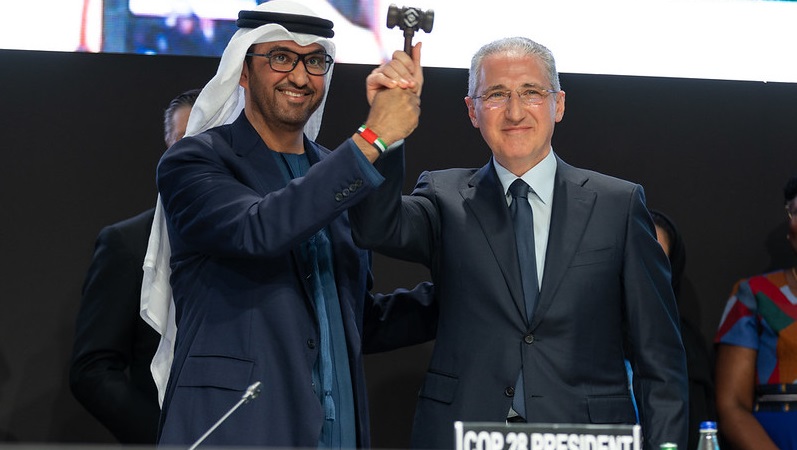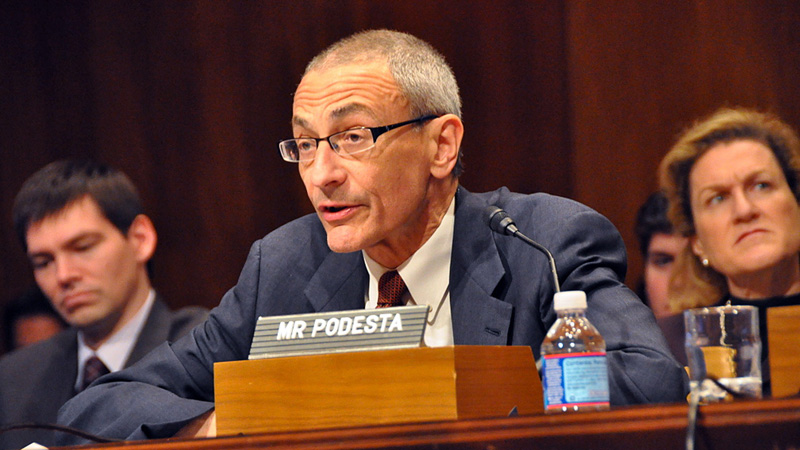Opening speeches
COP29 got underway in Baku on Monday morning with opening speeches from the UAE’s COP28 President Sultan Al-Jaber, the (now official) COP29 President Mukhtar Babayev of Azerbaijan, and the head of the UN’s climate arm Simon Stiell.
Al-Jaber boasted that 2024 saw record renewable energy growth, 55 companies have joined an oil and gas decarbonisation charter, and the UAE’s Alterra climate fund has allocated $6.5 billion. He didn’t mention that some of that money has been invested in a gas pipeline.
After being formally elected as COP29 president, Babayev then warned “we are on a road to ruin”, adding “people are suffering in the shadows; they are dying in the dark”, so “we need much more from all of you”.
He said negotiators had made progress on some aspects of the post-2025 climate finance goal due to be agreed at COP29 – including a ten-year time-frame, transparency and “access” features.
But there are differing views on how to achieve the trillions of dollars in climate finance developing countries need, Babayev said, adding that he has “heard that a realistic goal for what the public sector can directly provide and mobilise seems to be in the hundreds of billions”. In the Guardian, he writes that “the onus cannot fall entirely on government purses”.
Stiell added a personal touch, becoming emotional as he put up a picture of him with his neighbour Florence in front of her hurricane-destroyed house on their native Caribbean island of Carriacou (part of Grenada).
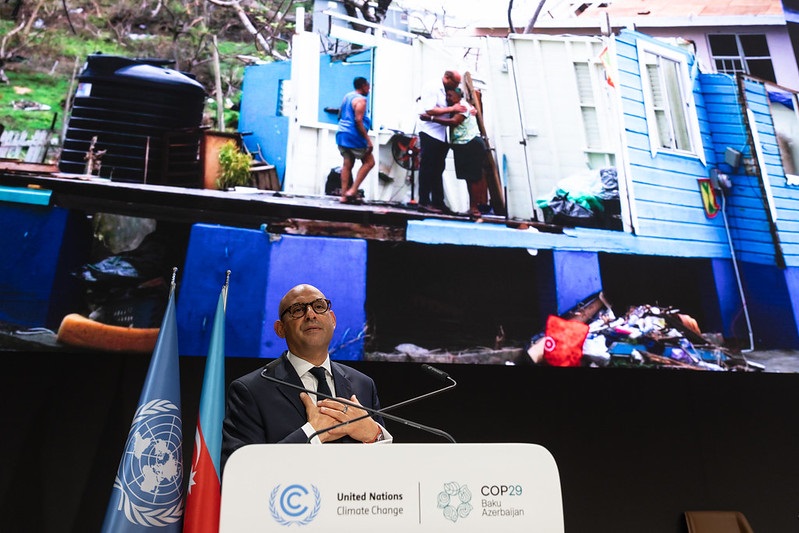
Simon Stiell speaks at COP29 in front of a picture of him and his neighbour Florence (UNFCCC/Kiara Worth)
He defended the UN climate process as “the only place we have” to “credibly hold each other to account to act” on the climate crisis. He said the process is working because, without it, humanity would be heading towards 5C of global warming.
The opening session was then suspended so that what would make it onto the summit agenda could be negotiated off camera.
Agenda fight resolved
By Monday evening, countries had agreed on the agenda for COP29 after resolving fraught issues in back-room talks.
Diplomats argued over how to follow up on the outcome of last year’s Global Stocktake – through which countries committed for the first time to “transitioning away from fossil fuels” in energy systems – and over whether trade measures should be formally discussed in Baku.
As the spectre of discussions stretching into the early hours for a second consecutive day loomed large, a breakthrough was found, announced by COP29 president Babayev in the restarted opening session at around 8pm local time.
The “UAE Dialogue” on implementing the outcomes of the Global Stocktake will find a home in the ‘finance’ track of the negotiations – where many developing countries wanted it to be.
But a footnote aimed at appeasing opposition from the EU and others leaves the door open to discussing additional matters in that forum, including – crucially – how to shift the world away from planet-heating fossil fuels.
Separately, the BASIC group of emerging economies – led by China – had earlier proposed an agenda item on “unilateral restrictive trade measures”. This would have targeted proposals like Europe’s carbon border tax and was therefore opposed by the EU.
On the first day of the conference, BASIC agreed to drop this agenda item when reassured it would be the subject of presidential consultations – a compromise similar to last year.
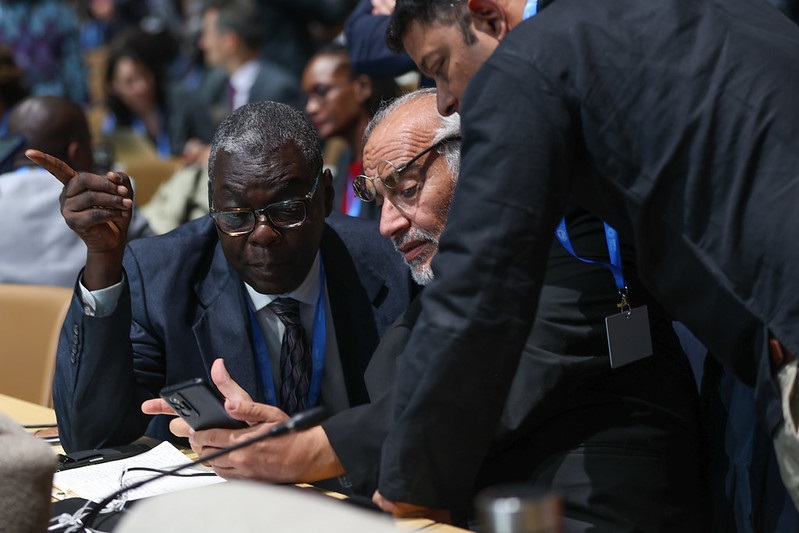
Negotiators in discussion at the COP29 opening plenary (Picture: Kiara Worth/UNFCCC)
Carbon market coup?
As it geared up to host COP29, the Azerbaijan presidency repeatedly listed the elusive “full operationalisation” of Article 6 of the Paris Agreement among its top priorities for the summit.
On the opening day, Baku scored what it saw as an early goal by getting countries to rubber-stamp rules on some key building blocks of the UN’s new global carbon market under Article 6.4 that were adopted by the mechanism’s Supervisory Body last month.
The technical committee had taken matters into its own hands after diplomats failed at two successive COPs to agree on guidance for the development of carbon-credit methodologies and carbon removal activities. In a surprise move at its last meeting before the summit, the Supervisory Body approved these key documents as “standards” instead of sending them as recommendations to be fought over in Baku, as had previously been the norm.
UN approves carbon market safeguards to protect environment and human rights
The apparent coup left countries with one binary decision to make: approve or reject the whole approach. They went with the former option, supporting a decision that “takes note” of the Supervisory Body’s adoption of the documents but reiterating that the rule-making panel remains “fully accountable” to the COP and its work has not ended.
COP29 President Babayev celebrated the approval, saying the UN carbon market “will be a game-changing tool to direct resources to the developing world”.
“Following years of stalemate, the breakthroughs in Baku have now begun. But there is much more to deliver,” he added.
Some were unhappy with the swift adoption, however. A negotiator from Tuvalu took to the floor at the plenary to point out that the Pacific island nation had accepted the decision “with some reluctance”, adding that he was “very uncomfortable with this trend” of sidestepping proper scrutiny.
Many civil society groups have sharply criticised the move for the same reason, but also because they believe some of the approved measures risk undermining the integrity of the new carbon crediting mechanism.
Isa Mulder, a policy expert at Carbon Market Watch, said the decision “sets a poor precedent for transparency and proper governance”. “If these texts can be adopted in this way,” she added, “where do we draw the line?”
Erika Lennon, a senior attorney at CIEL, said the Supervisory Body’s efforts to complete the process “resulted in risky rules that will lead to human rights violations and environmental harm”. “This is hardly a win for the planet,” she added.
2024 set to be hottest year
In an update to its “State of the Climate 2024” report, released on Monday, the World Meteorological Organization (WMO) said 2024 is on track to be the warmest year on record.
In the period from January to September, the global mean surface air temperature was 1.54C above the pre-industrial average, with climate warming boosted by the El Niño weather pattern, the WMO said.
However, monthly or annual warming of 1.5C or more does not mean the world has breached the Paris Agreement goal of limiting global temperature rise to 1.5C above pre-industrial times, as that refers to long-term warming measured over decades, the WMO emphasised.
The report said 2015-2024 would be the warmest ten years on record, adding that ocean warming rates show a particularly strong increase in the past two decades and the planet’s seas will continue to heat up irreversibly.
WMO Secretary-General Celeste Saulo warned that although the world has not yet broken the 1.5C limit, “it is essential to recognise that every fraction of a degree of warming matters. Whether it is at a level below or above 1.5C of warming, every additional increment of global warming increases climate extremes, impacts and risks.”
Climate Home has summarised the latest batch of international climate reports intended to inform and drive the negotiations at COP29.
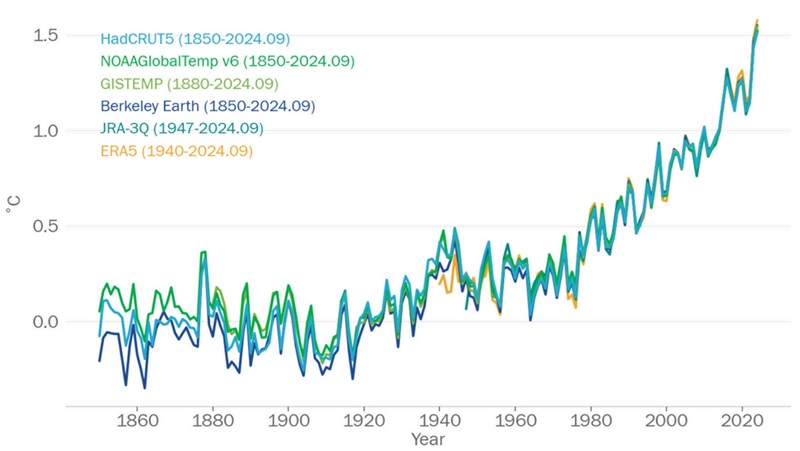
Annual global mean temperature anomalies (relative to 1850–1900) from 1850 to 2024 from six datasets. The 2024 average is based on data from January-September. Source: WMO
US envoy strikes defiant tone
John Podesta, the US senior presidential advisor for international climate policy, said the country’s landmark climate law, the Inflation Reduction Act (IRA), would continue to slash greenhouse gas emissions even after the incoming Trump administration returns to the White House.
Speaking to the media at COP29 in Baku, the US head of delegation said the country is “facing new headwinds” that may “slow down” the energy transition. However, he added that i thanks primarily to initiatives led by the private sector and sub-national administrations.
“It is precisely because the IRA has staying power that I’m confident that the United States will continue to reduce emissions benefiting our own country and benefiting the world,” he said.
Podesta’s comments echoed the views of US climate experts and analysts, who described the shift to clean energy as “unstoppable” despite Donald Trump’s election victory last week.
The US envoy also noted China has a chance to lead global climate action, adding that, as the world’s largest emitting economy, China has “an obligation” to submit a 1.5C-aligned new climate plan that can send “a powerful signal to the world”.
“They have an important role to play and I hope that they play it,” he said.
On COP29, Podesta remained optimistic about achieving a new climate finance goal, saying “it needs to be realistic but we think we can get it done here [in Baku]”.
But he reiterated the developed countries’ determination to see contributors expanded to include wealthy developing countries like China. “An expanded donor base is long-warranted. This is not 1992,” Podesta added.
Late drop-outs
The COP29 organisers have published a new list of which world leaders will be speaking in Baku on Tuesday afternoon and Wednesday.
It’s a lot shorter than the previous version published last Sunday, November 3. Climate Home has counted 23 drop-outs and just four late additions.
Among the leaders who have cancelled are Saudi Arabia’s Mohammed Bin Salman, Ukraine’s Volodymyr Zelenskyy and the European Commission chief Ursula von der Leyen.
They have joined a long list of heavyweight absentees that were already known, including outgoing US President Joe Biden, Germany’s Olaf Scholz, France’s Emmanuel Macron, Canada’s Justin Trudeau and India’s Narendra Modi.
China’s Xi Jinping, Russia’s Vladimir Putin and Brazil’s Lula da Silva (due to a head injury) will also skip the high-level summit, sending deputies in their place.
Even climate-focused developing-country leaders like Colombia’s Gustavo Petro and Kenya’s William Ruto have vanished from the list. On the other hand, heads of state and government from Sudan, Iran, Egypt and Morocco will now be speaking.
Tomorrow’s speeches will start at 1.30pm local time, likely with a statement from Azerbaijan’s President Ilham Aliyev.
This is his chance to get his message across to the world, perhaps touting his COP of peace initiative which experts have dismissed as a “PR exercise”.
It may also be a good opportunity to announce Azerbaijan’s new NDC climate plan – which they have promised to release at COP29.
The day’s biggest news is likely to come late in the day from the UK’s new prime minister Keir Starmer, who is expected to announce new 2035 emissions reduction targets but not a full NDC climate plan.
The UK’s official climate advisory body says this target should be at least 81% on 1990 levels. The UK’s current target is 68% by 2030, which it is not on track to meet.
Brazil’s new 2035 target
On Friday night, the Brazilian government – which will host COP30 next year – announced a new 2035 emissions reduction target. It plans to cut emissions by 59-67% from 2005 levels, on the way to net zero by 2050.
Few other details have been announced so far and Brazil’s full UN climate plan – known as a Nationally Determined Contribution (NDC) – has yet to be published.
But the 59-67% target falls short of what Brazilian NGO Climate Observatory has said is compatible with Brazil’s fair share towards limiting global warming to 1.5C – which would be a 92% cut.
Climate Observatory said the new 2035 target is “misaligned with Brazil’s fair contribution to stabilising global warming at 1.5C”.
Natalie Unterstell, president of the Talanoa Institute, a Brazilian think-thank, said “the band target and the Brazilian government’s silence on the transition away from fossil fuels suggest weaknesses”.
Andreas Sieber from climate campaign group 350.org called it “minimally sufficient”, adding that it “reflects the imperfect yet persistent progress of climate diplomacy”.
The UAE announced its NDC last week – also seen by campaigners as falling short because it lacks a commitment to cut oil and gas production. Azerbaijan’s plan is expected at COP29, and most others will come next year.
In brief…
Climate disinfo on the rise – A report by Climate Action Against Disinformation, a coalition of NGOs, shows how conspiracies about climate disasters spread on social media enabled by the policies of the BigTech giants supposedly policing those platforms. A post on X saying that the Texas wildfires were started by Joe Biden’s entourage with a laser beam received more than four million views. The report also notes that fossil fuel firms pour vast amounts of cash into social media ads.
Repression “epidemic” – Since the Paris Agreement was adopted in 2015, more than 1,500 climate and human rights defenders have been murdered – and surveillance, intimidation, draconian laws and police brutality are becoming more common, warns a new briefing from civil society groups. It finds that repression and barriers like visa restrictions and hotel price-gouging have worsened and are limiting the diversity of voices heard at COPs.
Baking Baku: A Christian Aid report finds that, even if the world delivers on its climate pledges, Azerbaijan will suffer a 12.6% reduction in its GDP by 2070 because of climate change. With its cotton industry especially vulnerable, Azerbaijan tops the 10 countries in Eastern Europe facing the biggest economic harm from future temperature rises, according to the study.
